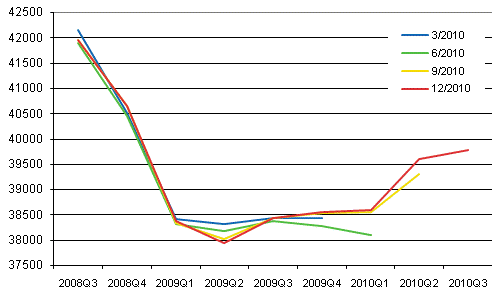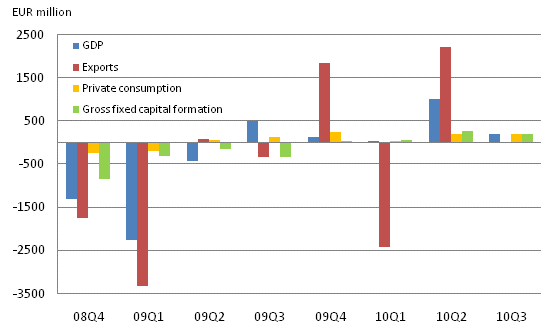1. Trade and construction sustained growth of the economy in the third quarter
In the third quarter of 2010, the volume of Finland’s gross domestic product went up by 0.5 per cent from the previous quarter. Adjusted for working days, gross domestic product was 3.7 per cent up on the third quarter of 2009. Calculated at current prices, GDP adjusted for working days grew by 6.4 per cent year-on-year.
The volume of seasonally adjusted GDP peaked in the second quarter of 2008 after which it fell very rapidly especially in the last quarter of 2008 and the first quarter of 2009. The economic downturn appears to have bottomed out in the second quarter of 2009. Since then, GDP has been growing slowly again and has now more or less reached the same level as in 2006.
Figure 1. Revisions - seasonally adjusted volume of GDP by release

Other European economies are also gradually recovering from the downturn. According to preliminary data compiled by Eurostat, in the third quarter of 2010 GDP in the EU-27 area went up by 0.5 per cent from the previous quarter.
1.1. Output
In primary production, that is, agriculture, forestry and fishery, the volume of value added was 5.3 per cent smaller in the third quarter than in the previous quarter but 1.2 per cent up year-on-year. Grain crop in agriculture was the worst in the 2000s.
Manufacturing output fell slightly in the third quarter. Its value added was 1.6 per cent down on the previous quarter but 3.5 per cent up on the respective quarter twelve months back. The wood and paper industry generated 5.4 per cent less value added than in the previous quarter but still 7.3 per cent more than twelve months ago. In the metal industry (incl. electrical and electronics industry) value added decreased by 1.8 per cent from the previous quarter but increased by 2.7 per cent from one year back. In other manufacturing value added grew by 0.6 per cent from the quarter before and by 2.4 per cent year-on-year.
The volume of value added in construction turned towards clear growth in the second quarter and the growth continued through the third quarter. In the July to September period output went up by 2.5 per cent from the previous quarter and by 9.3 per cent from one year back.
In service industries value added remained on level with the previous quarter but was up by 2.6 per cent compared to the respective quarter twelve months back. In trade value added was 2.1 per cent up on the previous quarter and 7 per cent up year-on-year. Transport, storage and communications grew by 2.1 per cent from the previous quarter and by 7.4 per cent from one year back. In real estate and business activities value added decreased by 0.3 per cent from the previous quarter but increased by 0.4 per cent from one year ago.
The volume of total value added generated by all industries grew by 0.2 per cent from the previous quarter and by 3.2 per cent from twelve months back.
1.2. Imports, exports, consumption and investments
Total demand grew by 0.9 per cent from the previous quarter and by 5.5 per cent year-on-year. Demand was increased especially by private consumption and investments in residential buildings.
Figure 2. GDP and expenditure components, change from previous quarter (seasonally adjusted, at reference year 2000 prices)

In the third quarter, the volume of exports decreased by 0.1 per cent from the previous quarter but was 9.4 per cent up year-on-year. Exports of goods went up by 0.9 per cent from the previous quarter but exports of services decreased by 7.3 per cent. The volume of imports grew by 5.5 per cent from the previous quarter and was 7.3 per cent up year-on-year. Imports of goods increased by 5.4 per cent and imports of services by 5.6 per cent from the previous quarter.
Revisions put the change in imports in the second quarter at +7.5 per cent from the previous quarter while the originally calculated figure was +6.6 per cent. The change in the volume of exports in the second quarter became revised to +13.5 per cent from the original figure of +12.6 per cent. Data on imports and exports may become substantially revised.
In the third quarter, the volume of private consumption grew by 0.9 per cent from the previous quarter and by 3.1 per cent from twelve months back. The volume of public consumption expenditure grew by 0.3 per cent from the previous quarter and was on level with twelve months back.
In the third quarter, the volume of investments increased by 2.7 per cent from the quarter before and by 8.9 per cent year-on-year. Construction investments went up by 3.4 per cent from the previous quarter and by 12.7 per cent from one year back. Investments in residential buildings continued to show strong growth in the third quarter and their volume rose by 5.6 per cent from the previous quarter and by 36.9 per cent year-on-year. The volume of investments in machinery, equipment and transport equipment contracted by 2.3 per cent from the previous quarter and by 1.1 per cent year-on-year. Private investments increased by 2.8 per cent and public investments by 6.2 per cent from the quarter before.
1.3. Employment, wages and salaries and national income
In the third quarter, the number of employed persons remained on level with the previous quarter but was 0.5 per cent higher than twelve months earlier. However, the number of hours worked in the national economy decreased by 0.8 per cent from the previous quarter and by 0.5 per cent from one year back. The quarter contained the same number of working days as the corresponding quarter of the year before.
According to Statistics Finland’s Labour Force Survey, the rate of unemployment for the July to September period was 7.3 per cent. In the corresponding period of 2009 it stood at 7.5 per cent.
In the July to September period the nominal wages and salaries bill of the national economy grew by 0.9 per cent from the previous quarter and by 3.3 per cent year-on-year. The operating surplus (net), which in business bookkeeping corresponds roughly with business profit, grew by 23 per cent at current prices from twelve months back. Gross national income calculated at current prices was 5.6 per cent higher than one year previously.
1.4. The available data
These preliminary data on the third quarter of 2010 are based on the information on economic development that had become available by 26 November 2010.
Data at the annual level correspond with the national accounts data released on 15 July 2010 with the exception of transactions with the rest of the world (exports, imports, primary income from the rest of the world) which may deviate from annual accounts data when revised. Data concerning the last quarter of 2010 will be released on 1 March 2011, when the data for earlier quarters will also be revised. Quarterly data continue to be revised until final annual accounts data are published at the lag of around two years. Seasonally adjusted and trend time series always become revised against new observations irrespective of whether the original time series becomes revised or not.
The new calculation methods of quarterly national accounts are elaborated upon in a separate methodological release: http://tilastokeskus.fi/til/ntp/men_en.html
Further information on the seasonal adjustment method: http://tilastokeskus.fi/til/tramo_seats_en.html
Source: National Accounts 2010, 3rd quarter. Statistics Finland
Inquiries: Pasi Koikkalainen (09) 1734 3332, Samu Hakala (09) 1734 3756, Samu Hakala (09) 17343756, kansantalous.suhdanteet@stat.fi
Director in charge: Ari Tyrkkö
Updated 9.12.2010
Official Statistics of Finland (OSF):
Quarterly national accounts [e-publication].
ISSN=1797-9765. 3rd quarter 2010,
1. Trade and construction sustained growth of the economy in the third quarter
. Helsinki: Statistics Finland [referred: 11.2.2026].
Access method: http://stat.fi/til/ntp/2010/03/ntp_2010_03_2010-12-09_kat_001_en.html

